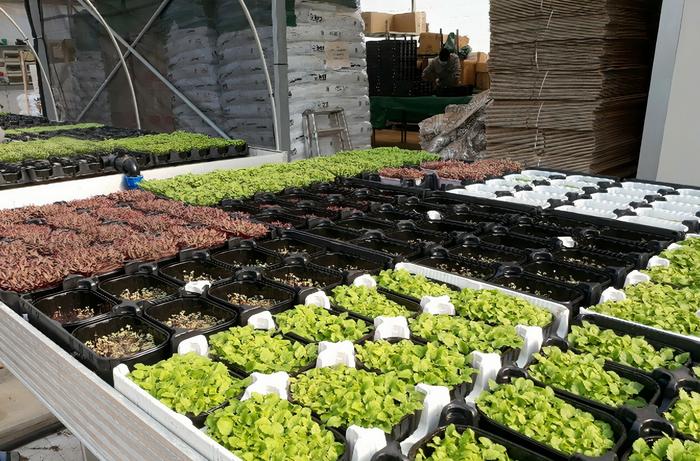In a significant development for personalised nutrition, researchers in Italy have cultivated microgreens with bespoke nutritional profiles to serve individual dietary requirements.

Credit: Massimiliano Renna
In a significant development for personalised nutrition, researchers in Italy have cultivated microgreens with bespoke nutritional profiles to serve individual dietary requirements.
The study, published in the Journal of the Science of Food and Agriculture (doi: 10.1002/jsfa.13222), provides a blueprint for the soilless cultivation of nutritionally enriched plants in a commercial greenhouse setting.
Co-authors Massimiliano D’Imperio and Francesco Serio, both at the Institute of Sciences of Food Production (ISPA) National Council of Research (CNR); and Massimiliano Renna, professor of agricultural and environmental science at the University of Bari Aldo Moro, Italy, explained the motivation behind the research.
‘Propelled by an ever-growing awareness of the importance of following dietary recommendations, interest in personalised nutrition is on the rise. Soilless biofortification of vegetables has opened the door to the potential for adapting vegetable production to specific dietary requirements,’ Renna explained.
The team cultivated four different species – radish, pea, rocket and Swiss chard – and focused on two nutrients that play a crucial role in health and nutrition: iodine and potassium.
Iodine is critical to thyroid function, with deficiency affecting approximately two billion people worldwide. Fortifying table salt with iodine is a strategy used internationally to combat deficiency, while other sources in the human diet include fish, milk and eggs.
However, recommendations from the World Health Organisation to reduce daily salt intake, paired with an increase in vegetarian and vegan diets, mean demand is growing for alternative iodine sources.
Using tailored nutrient solutions for plant growth, the team successfully cultivated plants with iodine content up to 14 times higher than unfortified microgreens, as a novel dietary source of iodine.
They also grew microgreens with a 45% reduction in potassium levels, to cater for chronic kidney disease sufferers – for whom its intake must be restricted to avoid health complications.
‘Since vegetables contain high concentrations of potassium, patients with impaired kidney function are sometimes advised not to eat vegetables, or that they should be soaked in water and boiled to reduce the potassium content through leaching.
‘However, the reduction in potassium using such cooking methods can be considered limited, while other important minerals and vitamins could be significantly lost,’ the researchers noted. ‘In this context, the production of vegetables with low potassium content could be of great interest.’
The study was conducted in a commercial setting – at Ortogourmet, a working microgreen farm in southern Italy. Crucially, this supports the viability of cultivating customised microgreens on a large scale while maintaining optimal agronomic performance.
The microgreens were grown in a soilless system, where a liquid medium is used in place of soil and the plants are fed through a nutrient solution.
Explaining the advantages of a soilless system, the authors said, ‘Soilless cultivation is considered an advanced, environmentally friendly agricultural practice for enhancing the quality of fresh vegetables. In fact, although soilless cultivation systems have been developed primarily to address the challenge of excessive soil pathogens, it is nonetheless true that they also favour optimal control of plant growth, high productivity, and an efficient use of water and fertilisers. Furthermore, soilless systems represent an opportunity to modulate the nutrient solution precisely and efficaciously.’
The researchers are now turning their attention to manipulating the biological pathways of plants to produce desired compounds. ‘The key idea is to leverage in-depth knowledge of plant metabolic pathways to identify key points where intervention is possible to increase the production of desired molecules,’ they note.
‘The optimisation of these techniques will require in-depth research into the molecular biology of plants, including the metabolic pathways involved in the synthesis of target molecules, and a constant refinement of growth conditions. The combination of advanced scientific knowledge and innovative technologies can open new perspectives in the production of healthier and nutritionally biofortified vegetables.’
The research was funded by SOILLESS GO (Rural Development Program of the Apulia Region – Italy) and NUTRAGE projects (CNR, FOE-2021 project).
Journal
Journal of the Science of Food and Agriculture
DOI
10.1002/jsfa.13222
Method of Research
Experimental study
Article Title
Soilless cultivation systems to produce tailored microgreens for specific nutritional needs
COI Statement
The authors declare that they have no conflict of interest.




